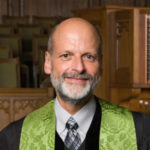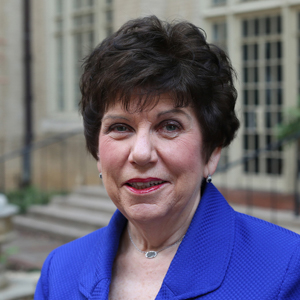 Good morning!
Good morning!
I hope this day finds you and your family well. I invite you to take a few moments with me to read and reflect upon today’s scripture selection — and to carry these thoughts with you into your day.
Today’s Scripture: Jeremiah 32:1-3a, 6-15
1 The word that came to Jeremiah from the Lord in the tenth year of King Zedekiah of Judah, which was the eighteenth year of Nebuchadrezzar. 2 At that time the army of the king of Babylon was besieging Jerusalem, and the prophet Jeremiah was confined in the court of the guard that was in the palace of the king of Judah, 3 where King Zedekiah of Judah had confined him. Zedekiah had said, “Why do you prophesy and say: Thus says the Lord: I am going to give this city into the hand of the king of Babylon, and he shall take it;
6 Jeremiah said, The word of the Lord came to me: 7 Hanamel son of your uncle Shallum is going to come to you and say, “Buy my field that is at Anathoth, for the right of redemption by purchase is yours.” 8 Then my cousin Hanamel came to me in the court of the guard, in accordance with the word of the Lord, and said to me, “Buy my field that is at Anathoth in the land of Benjamin, for the right of possession and redemption is yours; buy it for yourself.” Then I knew that this was the word of the Lord.
9 And I bought the field at Anathoth from my cousin Hanamel, and weighed out the money to him, seventeen shekels of silver. 10 I signed the deed, sealed it, got witnesses, and weighed the money on scales. 11 Then I took the sealed deed of purchase, containing the terms and conditions, and the open copy; 12 and I gave the deed of purchase to Baruch son of Neriah son of Mahseiah, in the presence of my cousin Hanamel, in the presence of the witnesses who signed the deed of purchase, and in the presence of all the Judeans who were sitting in the court of the guard. 13 In their presence I charged Baruch, saying, 14 Thus says the Lord of hosts, the God of Israel: Take these deeds, both this sealed deed of purchase and this open deed, and put them in an earthenware jar, in order that they may last for a long time. 15 For thus says the Lord of hosts, the God of Israel: Houses and fields and vineyards shall again be bought in this land.
Tim’s Devotional Reflection for Today
Our scripture reading today tells a strange story in a challenging time for Jeremiah’s fellow citizens, the people of God. Jeremiah’s nation Judah is under siege by the Babylonians. They have surrounded Jerusalem, and the city is under siege. They have overrun Jeremiah’s hometown of Anathoth. The people are at war. It is a difficult and uncertain time. Jeremiah is in prison because he told the truth. He prophesied for the Lord. The Lord told him to tell the king that he would be arrested and dragged away and that the city would fall. King Zedekiah did not want to hear that, so he had Jeremiah arrested and thrown in prison.
The Word of the Lord comes to Jeremiah in this circumstance, and God tells him that his cousin Hanamel, the son of his Uncle Shallum, will be coming and offering him the redemption of some family property in Anathoth. That’s a little strange to us. It’s part of the practices related to land that we read about in Leviticus to protect inheritances and keep the land in the family. It’s similar to our right of first refusal. A family member will be first in line for that, and if that person does not redeem the land, then the next person is in line for that, and so on. Jeremiah has the right of redemption.
We don’t know if Jeremiah was the first in line for the right of redemption. It might be that Hanamel had tried others, and the people said, “You’re crazy! I’m not buying a piece of land when we’re under siege. That makes no sense.” But Hanamel did come to Jeremiah as the Lord had said. Jeremiah bought the land as the Lord commanded. He paid seventeen shekels of silver for it. He goes into great detail in his own words about how he weighed out the silver, how he gathered together witnesses, how they executed the deed, and how he gave it to Baruch to put it in a clay vessel.
Jeremiah did what those witnesses to the transaction must have thought was crazy. He bought land under siege. Jeremiah himself must have been aware of how crazy that was because five times in this brief passage, Jeremiah says it was the Word of the Lord that told him to do it.
Then we find out in the fifteenth verse what this action means. The words of the fifteenth verse are this: “For thus says the Lord of hosts, the God of Israel. Houses and fields and vineyards shall again be bought in this land.” Jeremiah acted in a concrete way to express his faith. By investing Jeremiah in the future, Jeremiah said that there is hope. History is headed someplace, and God will fulfill what God is doing. In other words, Jeremiah put his money where his faith was.
What Jeremiah was doing was not just investing in land futures. It’s much more significant than that. By redeeming the land, Jeremiah was a redeemer for the family and the family’s property. That action was symbolic of God. God is the Redeemer of the people. The future is in God’s hands. There is hope because God will redeem the people of God.
In verse 14, Jeremiah talks about one of the details of God’s instructions. When he gave the deed to Baruch to have it sealed in a clay jar, what was that about? Think about the Dead Sea scrolls discovered years ago. The Dead Sea scrolls were in excellent shape after two thousand years because the clay jars had protected them. The message in verse 14 is to put that deed in a clay jar because that is an act of faith for the long term. Jeremy might never live to see the day when he could use that property, but he bought it while under siege as an act of Faith.
In the week following September 11, many people encouraged Americans to buy stock. Because it was an excellent investment? No, because it was an act that expressed what we believe about the future of our nation and that we will not have our lives torn apart by fear. It would express in a concrete way what we believe about the future.
There is an inscription on the door of The Chapel of the Holy Trinity at Staunton Harold in England that says:
In the yeare 1653
When all things sacred
Were throughout ye nation
Either demolished or profaned
Sir Robert Shirley, Baronet,
Founded this church;
Whose singular praise it is,
To have done the best things
In ye worst time,
And hoped them in the most calamitous.
Robert Shirley, in a time when everything sacred throughout the nation was either demolished or profaned, a terrible time to build a church, took that leap of faith and built a church.
Leonard Sweet talks about two villages in North Carolina. One of them is called Luck. Not far away is the Village of Trust. He said that we all live in one village or the other; we live in luck, or we live in trust. We live by dumb luck, or we live trusting in God. As people of faith, our calling is to live in trust.
Trust is an excellent synonym for the word faith that we find in scripture. You can plug in the word trust wherever you see the word faith, and it will fit almost all the time because the word faith is an active word. What allows us to move from the village of luck to the village of trust is knowing the who behind it all.
The questions for us to ponder in difficult times are Do we live in luck or in trust? Do we trust enough to invest ourselves in the future? Do I put my money, time, action, resources, and life where my faith is?
Hymn: “O God, Our Help in Ages Past” by Isaac Watts (1719)
O God, our help in ages past,
our hope for years to come,
our shelter from the stormy blast,
and our eternal home:
Under the shadow of your throne
your saints have dwelt secure;
sufficient is your arm alone,
and our defense is sure.
Before the hills in order stood,
or earth received its frame,
from everlasting you are God,
to endless years the same.
A thousand ages in your sight
are like an evening gone,
short as the watch that ends the night
before the rising sun.
Time, like an ever-rolling stream,
soon bears us all away;
we fly forgotten, as a dream
dies at the op’ning day.
O God, our help in ages past,
our hope for years to come,
still be our guard while troubles last,
and our eternal home!
Thank you for sharing this moment of your day with me, with God, and with these reflections on a portion of scripture. I hope you will carry these with you throughout your day and night.
Grace and Peace,
![]()
Dr. Tim Bruster
Senior Pastor

